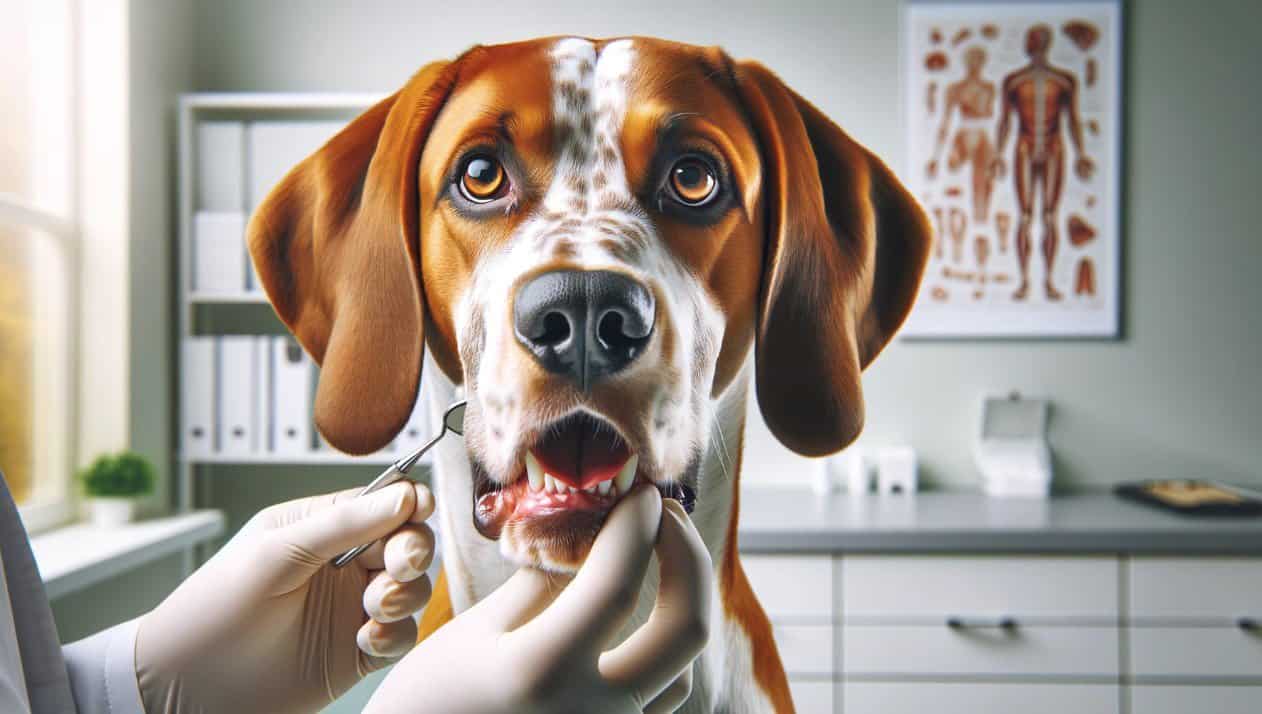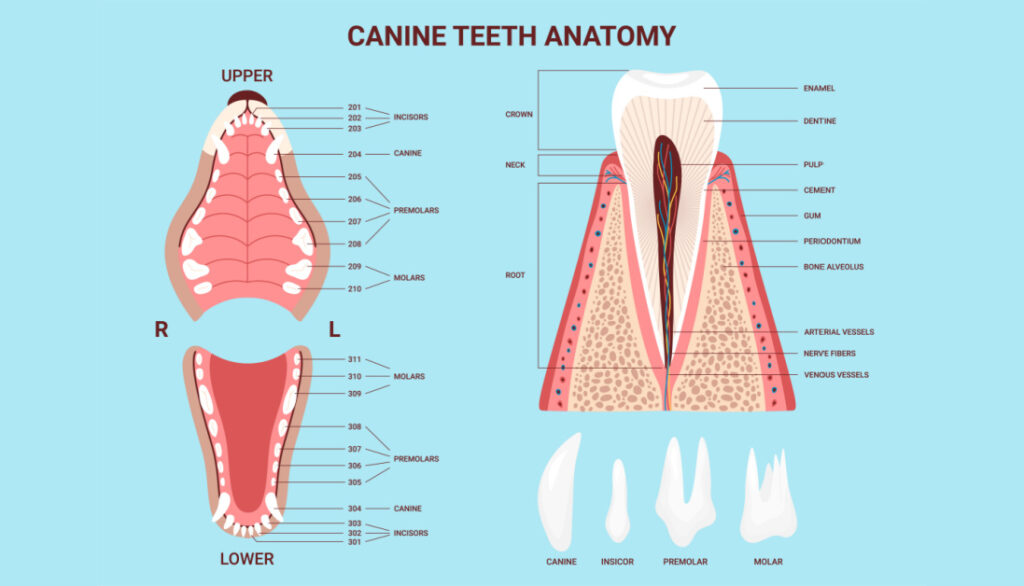Hi there, fellow dog lover! I’m Dr. Candy, your friendly holistic veterinarian. Today, let’s talk about a topic that’s close to my heart – Braque du Bourbonnais Dental Health. As a vet, I’ve seen firsthand how dental issues can affect our furry friends, and it’s especially crucial for specific breeds like the Braque du Bourbonnais.
Did you know that dental health is a significant aspect of your dog’s overall well-being? It’s not just about a sparkling smile or fresh breath – poor oral hygiene can lead to severe health problems, including heart disease.
Understanding the signs of dental disease, common dental health issues, and the available treatments are key to ensuring your Braque du Bourbonnais enjoys a long, happy life. So, let’s dive into the world of dog dental health and explore how we can keep your pup’s pearly whites in tip-top shape. Remember, a healthy mouth equals a healthy hound!

Signs of Dental Disease in Braque du Bourbonnais
As a caring Braque du Bourbonnais parent, you’re undoubtedly keen to ensure your furry friend stays in the best possible health. But did you know that your dog’s dental health plays a crucial role in their overall well-being? Let’s delve into the signs of dental disease in this breed and how you can spot them early.
Bad breath is often the first sign of dental disease. While it’s normal for your dog to have a certain canine ‘scent’, persistent bad breath can indicate a buildup of bacteria in the mouth. This can lead to dental diseases such as periodontal disease, a condition where the gums become inflamed and can result in tooth loss.
Another sign to watch out for is a change in eating habits. If your Braque du Bourbonnais is reluctant to eat, particularly hard food, or appears to be chewing on only one side of their mouth, this could be a sign of dental discomfort or disease.
Excessive drooling, especially if it’s tinged with blood, is another red flag. This could indicate gum disease, oral injuries or even the presence of a foreign object lodged in your dog’s mouth.
Furthermore, if your Braque du Bourbonnais seems to paw at their mouth frequently or shows signs of irritability when their mouth area is touched, these could be indications of oral discomfort or pain.
Visibly yellow or brown teeth are also a clear sign of dental disease. Tartar buildup leads to discolored teeth and can cause gum disease if not addressed.
Regularly checking your Braque du Bourbonnais’ mouth for these signs can help you catch and address any dental issues early. By doing so, you’re not just safeguarding your dog’s dental health but also their overall well-being. After all, dental disease can lead to more severe health problems if left untreated, including heart, liver, and kidney disease.
So, remember, your Braque du Bourbonnais’ dental health is not just about maintaining that beautiful smile. It’s about ensuring they lead a healthy, comfortable, and happy life.
Common Dental Health Issues In Braque du Bourbonnais
As a veterinarian, I often see certain Braque du Bourbonnais dental health issues that are common in this breed. These include:
- Periodontal Disease: This is a common dental issue in many dog breeds, including the Braque du Bourbonnais. It’s caused by the buildup of plaque and tartar on the teeth, leading to gum inflammation and potential tooth loss.
- Bad Breath: Also known as halitosis, bad breath can be more than just a nuisance. It can be a sign of underlying dental health issues such as periodontal disease or tooth decay.
- Tooth Decay: Just like humans, dogs can also suffer from tooth decay, which can lead to pain, tooth loss, and other serious health problems if not addressed.
These Braque du Bourbonnais dental health issues can be quite serious if left untreated. But the good news is that they can be prevented with regular dental care and checkups. Ensuring your Braque du Bourbonnais has a proper diet and regular teeth cleaning can also help maintain their dental health.
Remember, as a responsible pet parent, it’s your duty to ensure your furry friend’s teeth are as healthy as possible. If you notice any signs of dental disease, such as bad breath, swollen gums, or difficulty eating, don’t hesitate to seek veterinary care.

Conventional Dental Health Treatments
Anesthetic Dental Cleanings
One of the primary methods of maintaining Braque du Bourbonnais dental health is through anesthetic dental cleanings. This process involves putting your dog under anesthesia, then thoroughly cleaning their teeth and gums. This is a highly effective way to combat tartar and plaque build-up, gum disease, and other dental issues common in this breed.
While under anesthesia, the vet can also perform a comprehensive oral examination, allowing them to identify and address any hidden issues. This could include extracting loose or damaged teeth, which could otherwise lead to infections or abscesses.
Potential Individual Health Obstacles
Despite the effectiveness of anesthetic dental cleanings, there are some potential health obstacles to consider. For instance, certain dogs may have heart problems, which could make anesthesia riskier. Similarly, some dogs may have drug sensitivities, which could lead to adverse reactions to the anesthesia.
Seizures are another health obstacle to consider. If your Braque du Bourbonnais has a history of seizures, anesthesia could potentially trigger them. Therefore, consult with your vet to determine if anesthetic dental cleanings are safe for your dog.
Extreme age can also be a factor. Older dogs may not tolerate anesthesia as well as younger ones, and they may also have additional health issues that could complicate the procedure. Again, it’s crucial to discuss these concerns with your vet.
While these potential health obstacles may seem daunting, remember that they are just that – potential. Not every dog will face these issues, and many can safely and effectively undergo anesthetic dental cleanings. The key is to work closely with your vet to ensure your Braque du Bourbonnais dental health is properly managed in a way that prioritizes their overall well-being.
Dr. Candy’s Holistic Approach To Oral & Dental Health
As a dog parent, you might be wondering if there’s a holistic approach to maintaining your Braque du Bourbonnais dental health. Well, you’re in luck! Dr. Candy, a renowned veterinarian, has a unique and effective method that focuses on two main areas: diet and oral health specific probiotics.
Diet- Low Carbs, Avoid Added Sugars, Enzymes In Fresh Food
Firstly, let’s talk diet. The food your Braque du Bourbonnais eats plays a significant role in their oral health. Dr. Candy suggests a diet low in carbohydrates. Why? Because carbs break down into sugars, and these sugars can contribute to tooth decay and gum disease.
Also, avoid foods with added sugars. These are not only bad for your dog’s overall health but can also lead to dental problems. Instead, opt for fresh foods that are high in enzymes. Enzymes are crucial for breaking down food particles and preventing plaque buildup. Things like raw carrots, apples, and celery are excellent choices as they naturally clean your dog’s teeth while they chew.
Oral Health Specific Probiotics
Moving on to the second part of Dr. Candy’s approach – oral health specific probiotics. Probiotics are beneficial bacteria that can help keep your dog’s mouth healthy. They work by crowding out harmful bacteria, reducing plaque, and freshening breath.
One product that Dr. Candy highly recommends is Probiora for Dogs. This oral health targeted probiotic is specially formulated to support your dog’s dental health. It’s easy to use too – simply sprinkle it on your dog’s food once a day. Your Braque du Bourbonnais will love the taste, and you’ll love the results!
Remember, maintaining your Braque du Bourbonnais dental health doesn’t have to be complicated. By focusing on a low-carb, fresh food diet and incorporating oral health specific probiotics, you can help keep your dog’s teeth and gums healthy. After all, a healthy mouth is a key part of a happy, healthy dog!

Recommended Dental Chews & Products For Braque du Bourbonnais
As a dog parent, you may have come across commercially promoted dental chews that promise to maintain your Braque du Bourbonnais’s dental health. Unfortunately, many of these products don’t live up to their promises. They are often loaded with artificial ingredients and fillers, which do little to clean your dog’s teeth and can even contribute to dental issues. Moreover, some products like drinking water additives may harm the beneficial bacteria in your dog’s gut, further compromising their overall health.
So, what’s the alternative? The answer lies in natural, single source proteins, which are not only healthy but also effective in maintaining your dog’s dental health. Here are some of Dr. Candy’s recommended dental chews and products:
- Tendons: Tendons are a fantastic natural chew for your Braque du Bourbonnais. They are tough and fibrous, which helps to scrape off plaque and tartar from your dog’s teeth. Plus, they are a good source of protein and collagen, promoting good joint health.
- Raw Marrow Bones: Raw bones are another excellent choice for maintaining your dog’s dental health. They are a natural source of calcium and phosphorus, which are essential for healthy teeth and bones. Furthermore, the act of gnawing on bones can help to clean your dog’s teeth and gums.
- Bully Sticks: Bully sticks are made from 100% beef muscle, providing a natural and digestible chew for your dog. They can effectively remove plaque and tartar and are a good source of protein. However, always supervise your dog while they’re chewing on a bully stick to prevent any choking hazard.
Remember, while these dental chews and products can help maintain your Braque du Bourbonnais’s dental health, they should not replace regular check-ups with a vet. Regular professional cleanings are essential to prevent dental diseases and ensure your dog’s overall health.
Frequently Asked Questions
Q: What causes bad breath in Braque du Bourbonnais? A: Bad breath in Braque du Bourbonnais can be caused by various factors such as poor dental hygiene, gum disease, tooth decay, or underlying health issues. It is important to identify the root cause to effectively address the problem.
Q: How can I improve my Braque du Bourbonnais’ dental health? A: Regular brushing of your Braque du Bourbonnais’ teeth using a dog-friendly toothbrush and toothpaste is crucial. Additionally, providing dental chews or toys designed to promote oral hygiene can help reduce bad breath and maintain healthy teeth.
Q: Are there any specific dental products recommended for Braque du Bourbonnais? A: It is recommended to use dental products specifically formulated for dogs, including toothpaste and toothbrushes. Consult with your veterinarian to find the most suitable dental products for your Braque du Bourbonnais.
Q: Can a change in diet help improve my Braque du Bourbonnais’ bad breath? A: Yes, a balanced and nutritious diet can contribute to better dental health and fresher breath. Feeding your Braque du Bourbonnais high-quality dog food and avoiding sugary or low-quality treats can help prevent dental issues that cause bad breath.
Q: When should I seek veterinary help for my Braque du Bourbonnais’ bad breath? A: If your Braque du Bourbonnais continues to have persistent bad breath despite proper dental care, it is advisable to consult with a veterinarian. They can perform a thorough examination and determine if there are any underlying health issues contributing to the problem.
